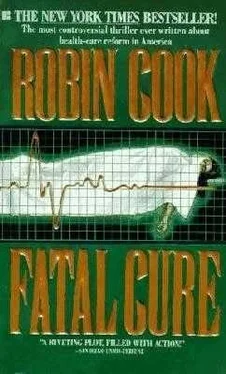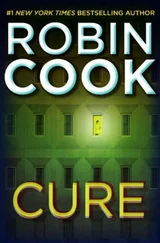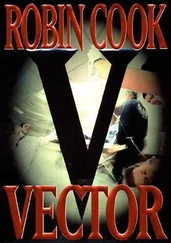"That's very generous of you," Donald said. "We still weren't sure what to do this morning, but after talking to you, I think I feel okay about it." Donald looked at the Josephsons. They nodded. "I think Mary Ann would have wanted it too, if it could help other people."
"I think it might," Angela said.
David and Angela went down into the basement to retrieve Mary Ann's body from the morgue. They took it up to the lab and rolled it into the autopsy room. The room had not been used for autopsies for several years and had become a storeroom. They had to move boxes from the old stainless-steel autopsy table.
David had planned to assist, but it quickly became apparent to Angela that he was having a hard time dealing with the situation. He was not accustomed to autopsies, and this was the body of a patient he had been treating only the day before.
"Why don't you go see your patients?" Angela suggested when she was ready to begin.
"You sure you can manage?" David asked.
Angela nodded. "I'll page you when I'm done, and you can help me get her back downstairs."
"Thank you," David said. At the door he turned. "Remember, consider the possibility of an unknown viral disease. So be careful. And also, I want a full toxicological workup."
"Why the toxicology?" Angela asked.
"I want to cover all the bases," David said. "Humor me, okay?"
"You've got it," Angela said agreeably. "Now get out of here!" She picked up a scalpel and waved for David to leave.
David let the autopsy room doors close behind him before he took off the hood, gown, and mask he'd donned for the post mortem. He was relieved to have been excused. David left the lab and climbed up to the patient floor.
He fully intended to discharge Jonathan Eakins, especially after he he'd been told by the nursing staff that there'd been no abnormal heartbeats. But that was before he went into Jonathan's room to say hello. Instead of experiencing Jonathan's usual cheerfulness, David found the man depressed. Jonathan said he felt terrible.
Sensitized by recent events, David's mouth became instantly dry. He felt a rush of adrenaline shoot through his body. Afraid to hear the answer, he asked Jonathan what was wrong.
"Everything," Jonathan said. His face was slack and his eyes lusterless. A string of drool hung down from the corner of his mouth. "I started having cramps, then nausea and diarrhea. I've no appetite and I have to keep swallowing."
"What do you mean you have to keep swallowing?" David asked fearfully.
"My mouth keeps filling up with saliva," Jonathan said. "I have to swallow or spit it out."
David desperately tried to put these symptoms into some recognizable category. Salivation keyed off a memory from medical school. He remembered it was one of the symptoms of mercury poisoning.
"Did you eat anything strange last night?" David asked.
"No," Jonathan said.
"What about your IV?" David asked.
"That was removed yesterday on your orders," Jonathan said.
David was panicky. Except for the salivation, Jonathan's symptoms reminded him of the symptoms Marjorie, John, and Mary Ann had experienced prior to their rapid deterioration and deaths.
"What's wrong with me?" Jonathan asked, sensing David's anxiety. "This isn't something serious, is it?"
"I was hoping to send you home," David said, avoiding a direct answer. "But if you are feeling this bad, maybe we'd better keep you for a day or so."
"Whatever you say," Jonathan said. "But let's nip this in the bud; I've got a wedding anniversary coming up this weekend."
David hurried back to the nurses' station with his mind in an uproar. He kept telling himself that it couldn't happen again. It was impossible. The odds were too small.
David threw himself into a chair and took Jonathan's chart from the rack. He went over it carefully, re-reading everything, including all the nurses' notes. He noticed that Jonathan's temperature that morning had been one hundred degrees. Did that represent a fever? David didn't know; it was borderline.
Rushing back into Jonathan's room, David had him sit on the side of his bed so that he could listen to his chest. His lungs were perfectly clear.
Returning to the nurses' station David leaned his elbows on the counter and covered his face with his hands. He had to think. He didn't know what to do, yet he felt he had to do something.
Impulsively David reached for the phone. He already knew the response he could expect from Kelley and CMV, but he didn't care. He called Dr. Mieslich, the oncologist, and Dr. Hasselbaum, the infectious disease specialist, and asked them both to come in immediately. David told them he believed he had a patient who was in the very early stages of the same condition that had proved mortal three times in as many days.
While David was waiting for the consults to arrive, he ordered a barrage of tests. There was always the chance that Jonathan would wake up the next day feeling fine, but David didn't think he could risk his patient's going the route of Marjorie, John, and Mary Ann. His sixth sense was telling him that Jonathan was already locked in a mortal struggle, and lately David's intuition had not been wrong.
The infectious disease specialist was first to arrive. After a quick chat with David, he went in to see the patient. Dr. Mieslich came in next. He brought with him his records of Jonathan's treatment when he had been his patient. Dr. Mieslich and David went over the record page by page. By then Dr. Hasselbaum was finished examining Jonathan. He joined David and Dr. Mieslich at the nurses' station.
The three men had just begun to discuss the case when David became aware that the two doctors were looking over his shoulder. David turned to see Kelley looming above him.
"Dr. Wilson," Kelly said, "may I have a word with you in the patients' lounge?"
"I'm too busy right now," David said. He turned back to his consults.
"I'm afraid I must insist," Kelley said. He tapped David on the shoulder. David brushed his hand off. He did not like Kelley touching him.
"This will give me a chance to examine the patient," Dr. Mieslich said. He stood up and left the nurses' station.
"I'll use the time to write up my consult," Dr. Hasselbaum said. He took his pen from his jacket pocket and reached for Jonathan's chart.
"All right," David said, standing up. "Lead on, Mr. Kelley."
Kelley walked across the corridor and stepped into the patient lounge. After David entered the room Kelley closed the door.
"I presume you know Ms. Helen Beaton, the hospital president," Kelley said, "and Mr. Michael Caldwell, the medical director." He gestured toward both people, who were sitting on the couch.
"Yes, of course," David said. He remembered Caldwell from Angela's interviews, and he'd met Beaton at several hospital functions. David reached out and shook hands with each. Neither bothered to stand up.
Kelley sat down. David did likewise.
David anxiously glanced around at the faces arrayed around him. He expected trouble from Kelley, thinking this meeting had to do with the autopsy on Mary Ann Schiller. He guessed that was why the hospital people were there. He hoped this didn't spell trouble for Angela.
"I suppose I should be forthright," Kelley said. "You probably wonder how we've responded so quickly to your handling of Jonathan Eakins."
David was flabbergasted: how could these three be here to talk to him about Jonathan when he'd only just started investigating the man's symptoms?
"We were called by the nursing utilization coordinator," Kelley explained. "She had been alerted by the floor nurses according to previous instructions. Utilization control is vital. We feel the need to intervene. As I've told you before, you are using far too many consults, especially outside the CMV family."
Читать дальше












